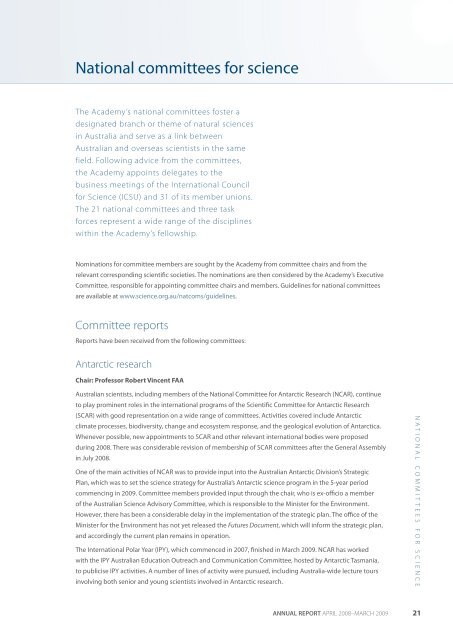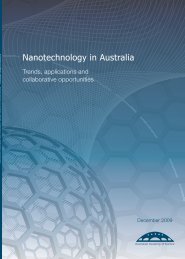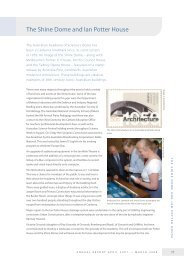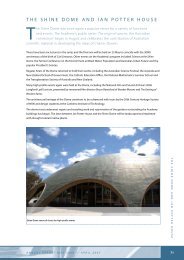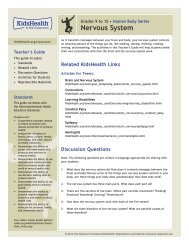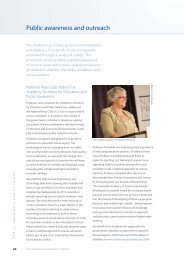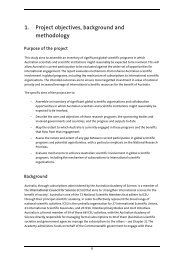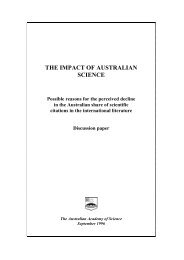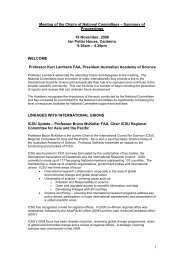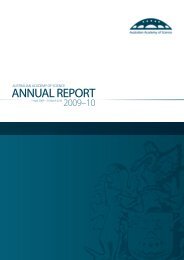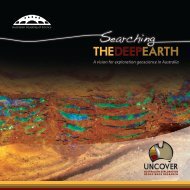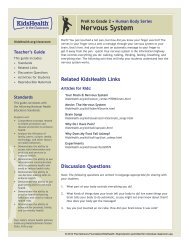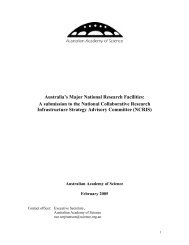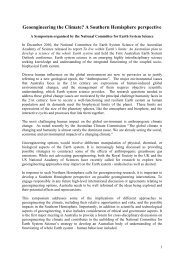full report - Australian Academy of Science
full report - Australian Academy of Science
full report - Australian Academy of Science
You also want an ePaper? Increase the reach of your titles
YUMPU automatically turns print PDFs into web optimized ePapers that Google loves.
National committees for science<br />
The <strong>Academy</strong>’s national committees foster a<br />
designated branch or theme <strong>of</strong> natural sciences<br />
in Australia and serve as a link between<br />
<strong>Australian</strong> and overseas scientists in the same<br />
field. Following advice from the committees,<br />
the <strong>Academy</strong> appoints delegates to the<br />
business meetings <strong>of</strong> the International Council<br />
for <strong>Science</strong> (ICSU) and 31 <strong>of</strong> its member unions.<br />
The 21 national committees and three task<br />
forces represent a wide range <strong>of</strong> the disciplines<br />
within the <strong>Academy</strong>’s fellowship.<br />
Nominations for committee members are sought by the <strong>Academy</strong> from committee chairs and from the<br />
relevant corresponding scientific societies. The nominations are then considered by the <strong>Academy</strong>’s Executive<br />
Committee, responsible for appointing committee chairs and members. Guidelines for national committees<br />
are available at www.science.org.au/natcoms/guidelines.<br />
Committee <strong>report</strong>s<br />
Reports have been received from the following committees:<br />
Antarctic research<br />
Chair: Pr<strong>of</strong>essor Robert Vincent FAA<br />
<strong>Australian</strong> scientists, including members <strong>of</strong> the National Committee for Antarctic Research (NCAR), continue<br />
to play prominent roles in the international programs <strong>of</strong> the Scientific Committee for Antarctic Research<br />
(SCAR) with good representation on a wide range <strong>of</strong> committees. Activities covered include Antarctic<br />
climate processes, biodiversity, change and ecosystem response, and the geological evolution <strong>of</strong> Antarctica.<br />
Whenever possible, new appointments to SCAR and other relevant international bodies were proposed<br />
during 2008. There was considerable revision <strong>of</strong> membership <strong>of</strong> SCAR committees after the General Assembly<br />
in July 2008.<br />
One <strong>of</strong> the main activities <strong>of</strong> NCAR was to provide input into the <strong>Australian</strong> Antarctic Division’s Strategic<br />
Plan, which was to set the science strategy for Australia’s Antarctic science program in the 5-year period<br />
commencing in 2009. Committee members provided input through the chair, who is ex-<strong>of</strong>ficio a member<br />
<strong>of</strong> the <strong>Australian</strong> <strong>Science</strong> Advisory Committee, which is responsible to the Minister for the Environment.<br />
However, there has been a considerable delay in the implementation <strong>of</strong> the strategic plan. The <strong>of</strong>fice <strong>of</strong> the<br />
Minister for the Environment has not yet released the Futures Document, which will inform the strategic plan,<br />
and accordingly the current plan remains in operation.<br />
The International Polar Year (IPY), which commenced in 2007, finished in March 2009. NCAR has worked<br />
with the IPY <strong>Australian</strong> Education Outreach and Communication Committee, hosted by Antarctic Tasmania,<br />
to publicise IPY activities. A number <strong>of</strong> lines <strong>of</strong> activity were pursued, including Australia-wide lecture tours<br />
involving both senior and young scientists involved in Antarctic research.<br />
NATIONAL COMMITTEES FOR SCIENCE<br />
ANNUAL REPORT APRIL 2008–MARCH 2009 21


